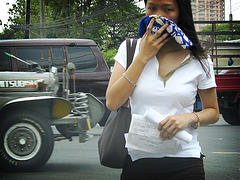10 Air Quality Tips for Travelers
31 May 2013
Outdoor air pollution – that toxic mix of particulate matter, biological materials, and chemicals that react with each other in the air is a big public health issue around the globe.
Poor air quality has been identified as a primary contributor to chronic diseases, hospitalization rates, and even premature death. The World Health Organization (WHO) has estimated that air pollution causes as many as 2 million premature deaths around the globe every year.
Big cities are often blamed for having the worst air quality: Hong Kong, Delhi, Manila, Cairo, Mexico City and Santiago are among a few, but smog also affects rural areas depending on the current geographic landscape and weather patterns. If high-polluting industries, such as refineries, mines, heavy manufacturing and smelting, are nearby, the air quality is often significantly reduced.
No matter where you go in the world, you won’t be able to completely escape air pollution because emissions in one country travel to others due to weather patterns. The length of exposure and the concentration of pollutants will also have an important impact on your health when you travel.
See the following air quality tips for travelers.
Common Symptoms Indicate Suffering from Air Pollution
What are the symptoms a traveler should recognize when they are suffering from poor air quality? The short-term symptoms of exposure to poor air quality include:
- itchy eyes, nose and throat
- wheezing
- coughing
- shortness of breath
- headaches,
- nausea
- chest pain
- upper respiratory issues
The long-term effects include lung cancer, cardiovascular disease, chronic respiratory illness, and the development of allergies. Air pollution is also associated with heart attacks and strokes.
3 Factors Affect How a Traveler Reacts to Poor Air Quality
Some personal factors have a big affect on how poor air quality affects a particular traveler. These include:
A traveler’s current health
Allergies, heart and lung diseases, bronchitis, asthma are all health concerns that could affect your body reacts to poor air quality.
A traveler’s destination
If you are headed to an urban area or one known for poor air quality and/or lack of rain, then you may be headed for an area with poor air quality.
A traveler’s age
Elderly people and young children are more susceptible to having problems with poor air quality. The elderly often have pre-existing medical conditions and younger people take in more air – and therefore a higher level of pollutants – due to their lower body weight.
The length of a trip and the season of the year also affect how much a traveler’s body reacts to poor air quality. A shorter trip means less air breathed and fewer pollutants inhaled, for example. Seasonal weather patterns also affect air quality in certain parts of the world.
10 Air Quality Tips for Travelers
Industrialized countries have long worked to reduce levels of noxious gases, sulfur dioxide, smog, and smoke in order to improve people’s health.
- Know how to determine the air quality where you’re traveling. No one source publishes a comprehensive list of air quality conditions around the globe, but you can start with checking the local news sources and these links:
- AIRNow – for Asia, Australia, Europe, North America and South America
- WHO Public Health and Environment Outdoor Air Pollution Map
- Arthur Zbygniew’s Blog – which has links to air quality sites around the globe
- Check with your doctor to ensure it’s safe for you to travel to a particular destination and determine whether you need a breathing mask, inhaler, or other medications.
- If you’re traveling with young children or newborns, minimize their exposure or consider avoiding areas with poor air quality. Remember, the little ones inhale more often and therefore absorb more pollutants than adults as a result of their lower body weight.
- Older adults should visit their doctor for confirmation prior to traveling that they are healthy to travel. Depending on your doctor’s recommendations, a stress test and lung capacity test may be a good idea.
- If you have a history of cardiac or pulmonary disease, check with your doctor that your condition is under control prior to leaving.
- If you have asthma, ensure that you have an inhaler as well as backups and minimize your exposure to outdoor air during your trip.
- If you have Chronic Obstructive Pulmonary Disease (COPD), bronchitis, or emphysema, carry an inhaler, antibiotics, and oral steroids in addition to your usual medications and with your doctor’s guidance.
- Even if it’s a problem for your itinerary, try to heed the local warnings to stay indoors during high smog alert days.
- If air pollutant levels are high, limit your strenuous or outdoor physical activity even if you are very healthy – poor air quality can have an immediate and startling affect on your health as well as long-term consequences
- If air quality in a particular area is poor and the air pollution is problematic, consider reducing the amount of time you stay there.
Damian Tysdal is the founder of CoverTrip, and is a licensed agent for travel insurance (MA 1883287). He believes travel insurance should be easier to understand, and started the first travel insurance blog in 2006.
